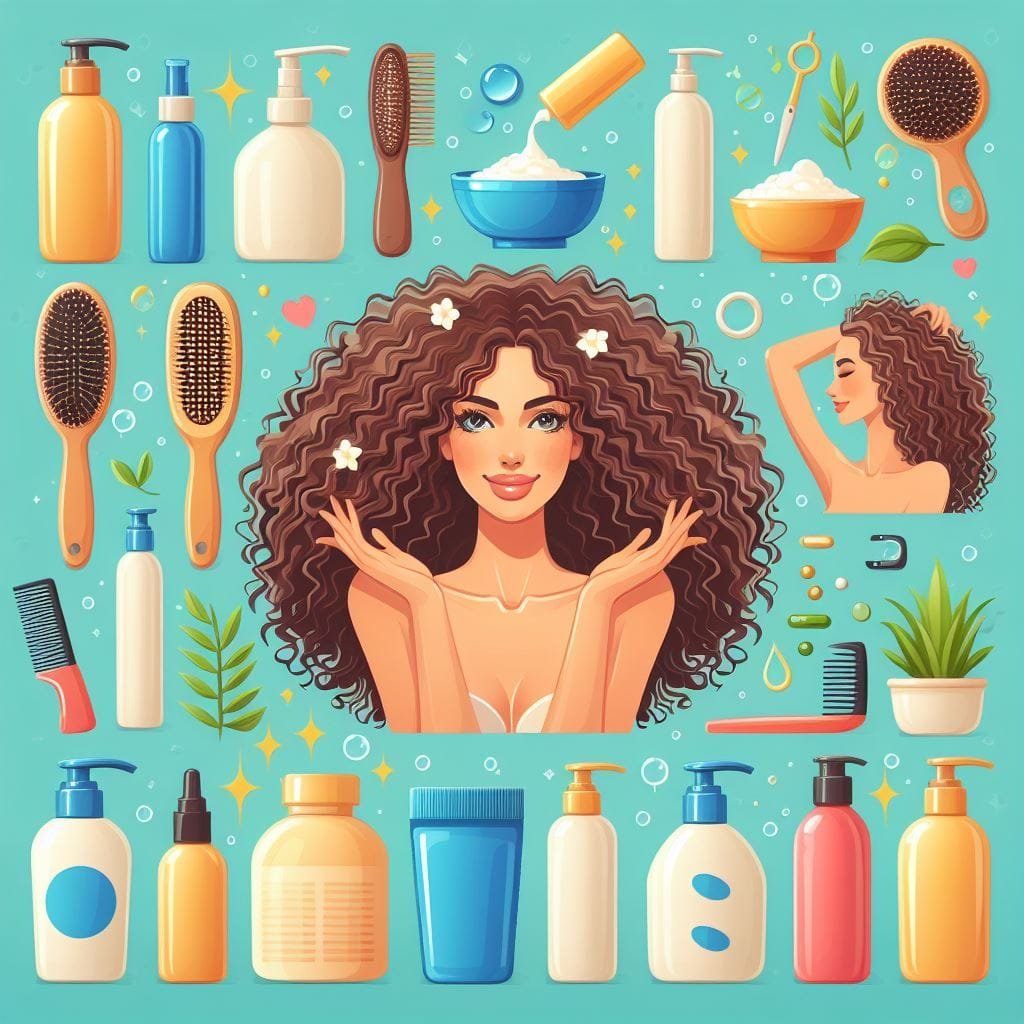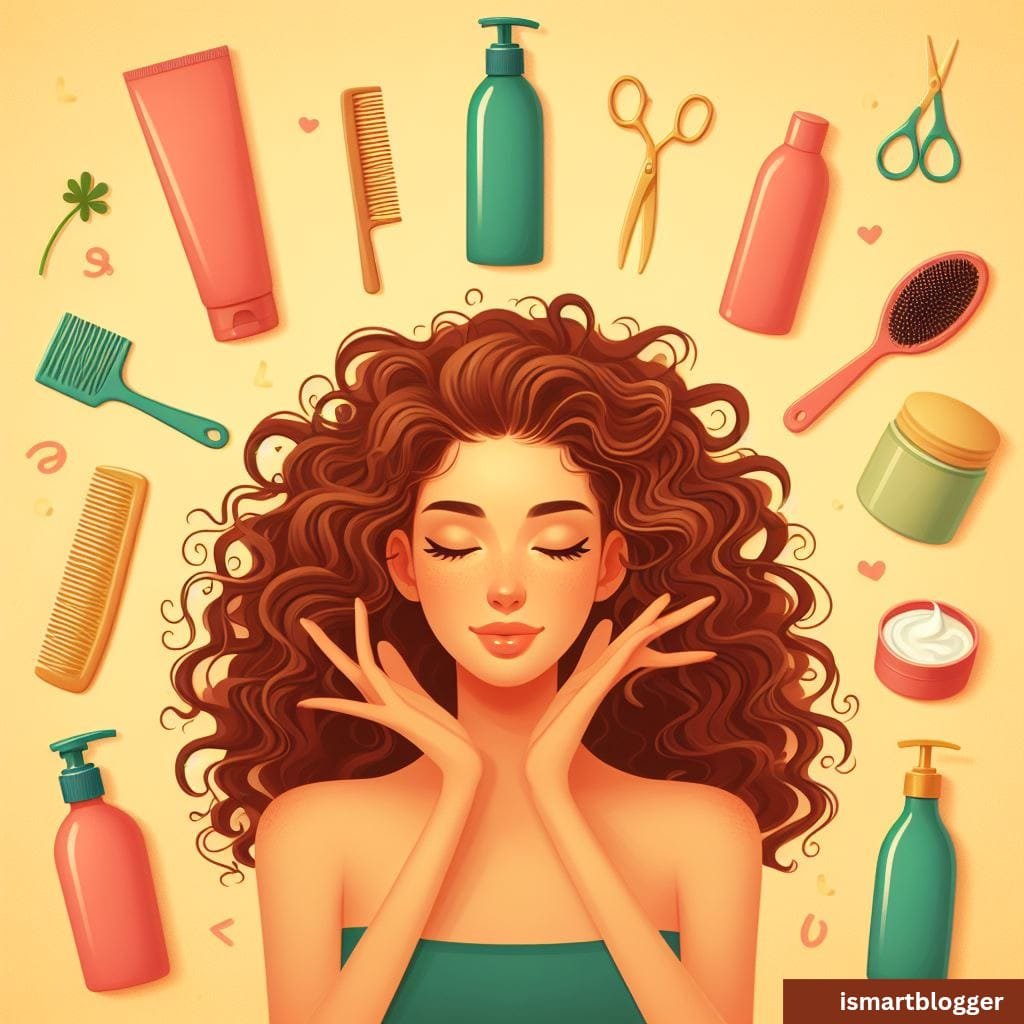Introduction
Curly hair is a magnificent blessing, but it can also be quite a challenge to tame and maintain. Anyone with curly hair knows that the right shampoo and conditioner can make all the difference in achieving beautiful, frizz-free curls.
It is not simply a matter of convenience; it is a matter of nourishing and caring for your unique hair type. Understanding that different hair types have distinct needs is crucial in selecting the right products.
Curly hair, in particular, requires specific attention due to its structure and tendencies. Unlike straight or wavy hair, curly hair has a natural tendency to be dry because the oils produced by the scalp struggle to travel down each strand.
This dryness can lead to frizz, breakage, and lackluster curls if not properly addressed. To combat these challenges and enhance the beauty of your curls, it is essential to choose shampoo and conditioner formulated specifically for curly hair.
These products are specially designed to provide adequate moisture while preserving the integrity of curl patterns. Without them, you may find yourself battling with unruly curls that refuse to cooperate.

The Importance of Using the Right Shampoo and Conditioner for Curly Hair
The significance of using suitable shampoo and conditioner for curly hair cannot be overstated. First and foremost, these products play a pivotal role in maintaining overall scalp health.
A healthy scalp is crucial for fostering strong follicles that promote optimal curl formation. Furthermore, using appropriate shampoo and conditioner allows you to maintain proper moisture balance in your curly locks.
As mentioned earlier, curly hair tends to suffer from dryness more than other types due to its structure which hinders oil distribution along each strand. By using products formulated specifically for curly hair needs, you ensure that your locks receive sufficient hydration without weighing them down or causing product buildup.
Different Hair Types Require Specific Products for Optimal Results
When it comes to hair care, the one-size-fits-all approach simply does not work. Understanding that different hair types have unique characteristics and needs is crucial in achieving optimal results.
Curly hair, being distinct from straight or wavy hair, demands specialized attention and products. While straight hair tends to be naturally oily, requiring lighter formulas that won’t weigh it down, curly hair thrives on moisture and benefits from richer formulations.
Shampoo and conditioner for curly hair are typically designed to provide deep hydration while taming frizz and enhancing curl definition. Using products specifically tailored for your curls ensures that you address the specific needs of your unique hair type.
Understanding Curly Hair
Detailed explanation of the unique characteristics and challenges of curly hair
Curly hair is a striking manifestation of diverse genetic traits and has its own set of distinct characteristics. Unlike straight or wavy hair, curly hair possesses a natural spiral or coil pattern that arises from the shape of the hair follicle. This curl pattern is determined by genetics and can range from loose waves to tight coils.
The unique structure of curly hair poses both advantages and challenges when it comes to styling and maintenance. One notable characteristic of curly hair is its tendency to be more prone to dryness compared to other hair types.
The twists and turns in the strands make it difficult for natural oils produced by the scalp (sebum) to travel down the shaft, resulting in less moisture distribution. As a result, individuals with curly hair often experience dryness, frizz, and brittleness.
Additionally, this dryness can lead to an increased likelihood of breakage and split ends. Another challenge faced by those with curly hair is managing frizz.
The uneven cuticle layer found in curly strands makes it easier for moisture to enter but also allows for humidity absorption from the environment. This absorption causes the individual strands to swell unevenly, resulting in frizz and an overall lack of definition in curl patterns.
Discussion on the different curl patterns and how they affect hair care needs
Curl patterns vary widely among individuals with naturally curly hair, which means that different products and techniques may be necessary depending on one’s specific curl type. The most common classification system used to describe curl patterns includes three main categories: Type 2 (wavy), Type 3 (curly), and Type 4 (coily). Within each category, subcategories denoted by letters A through C indicate increasing tightness or coarseness within that particular type.
Type 2 hair typically has loose, defined S-shaped waves that range from fine to coarse. This hair type generally requires lightweight products that provide moisture without weighing down the waves.
Type 2A hair may benefit from volumizing shampoos and conditioners to enhance the natural texture, while Type 2C hair may require more moisturizing products to combat potential dryness. Type 3 curls are characterized by tighter, well-defined ringlets or spirals.
This curl pattern often benefits from products that provide hydration and definition. Curly individuals should opt for sulfate-free shampoos and curl-enhancing conditioners formulated specifically for their texture, as these will help define their curls while reducing frizz.
Twisting or scrunching techniques can also be employed during styling to encourage curl formation. Type 4 hair showcases tightly coiled or zigzag-shaped strands that can range from fine to coarse in texture.
This curl pattern requires deep hydration to combat the natural dryness associated with tight coils. Moisturizing shampoos and conditioners rich in nourishing ingredients such as shea butter, argan oil, or aloe vera can help replenish moisture levels and promote healthy growth.
Understanding your specific curl pattern is crucial when selecting appropriate shampoo and conditioner for curly hair. By addressing the unique characteristics and challenges of each curl type, you can tailor your haircare routine to meet your individual needs effectively
Moisture Balance: Importance of maintaining moisture in curly hair
Curly hair is naturally prone to dryness due to its structure. The twists and turns of each strand make it difficult for natural oils produced by the scalp to travel down the hair shaft, resulting in a lack of moisture. This makes it crucial for individuals with curly hair to prioritize moisture balance when choosing shampoo and conditioner.
One crucial factor to consider is avoiding shampoos that contain sulfates. Sulfates are harsh detergents commonly found in many commercial shampoos, known for their ability to create a rich lather.
However, they can strip away the natural oils that curly hair needs to stay hydrated. Opting for sulfate-free shampoos will help retain the hair’s natural oils, preventing excessive dryness.
Ingredients to Avoid: Explanation of how these ingredients can cause frizz, dryness, and product buildup
When selecting products for curly hair, it is essential to be aware of certain harmful ingredients that can have adverse effects on its health and appearance. Sulfates, such as sodium lauryl sulfate (SLS) or ammonium laureth sulfate (ALS), are one such group of ingredients notorious for their drying properties. They can strip away moisture from both the scalp and hair strands, resulting in increased frizz and brittleness.
In addition to sulfates, parabens and silicones should also be avoided. Parabens are preservatives commonly used in personal care products but have been linked to potential hormone disruption.
Silicones are synthetic substances that coat the hair shaft but do not provide actual hydration; instead, they create a barrier that prevents moisture from penetrating the strands. These harmful ingredients can lead not only to dryness but also product buildup over time.
Product buildup occurs when residues from shampoos, conditioners, and styling products accumulate on the hair strands, weighing them down and hindering their ability to absorb moisture. It is crucial to be mindful of these ingredients and opt for products labeled as sulfate-free, paraben-free, and silicone-free for healthier curls.
Hydrating Properties: Discussion on the significance of choosing hydrating shampoos and conditioners to combat dryness in curly hair
Hydration is a vital aspect of maintaining healthy and vibrant curls. Choosing shampoos and conditioners with hydrating properties can help combat dryness, enhance curl definition, and promote overall hair health. One key ingredient to look for in hydrating products for curly hair is shea butter.
Shea butter is known for its moisturizing properties as it contains fatty acids that nourish the hair strands and lock in moisture. It helps prevent breakage, reduces frizz, and leaves curls feeling soft and manageable.
Coconut oil is another highly effective ingredient that provides deep hydration to curly hair. Its small molecular structure allows it to penetrate the hair shaft easily, replenishing moisture from within.
Coconut oil also helps strengthen the hair cuticle, making it less prone to damage caused by environmental factors or heat styling. Glycerin is a humectant often found in hydrating shampoos and conditioners.
It works by attracting moisture from the surrounding environment to bind it to the hair strands. This helps maintain optimal hydration levels in curly hair throughout the day, reducing dryness and promoting natural bounce.
Recommended Shampoo Brands for Curly Hair
High-End Brands
When it comes to high-end shampoo brands that are specifically formulated for curly hair, DevaCurl, and Ouidad are renowned names in the industry. These luxury brands have gained a loyal following due to their effectiveness in enhancing and maintaining the beauty of curly locks. DevaCurl, a pioneer in the curly hair care movement, offers an array of products tailored to different curl types.
One standout product from their range is the DevaCurl No-Poo Original Cleanser, which is a game-changer for those seeking a gentle alternative to traditional shampoos that can strip natural oils from curly hair. It cleanses without lathering and leaves curls feeling moisturized and defined.
Ouidad is another high-end brand that has earned its reputation for providing exceptional solutions for curly-haired individuals. Their unique product offerings address specific concerns related to curl types, including loose waves, classic curls, tight curls, and kinky coils.
The Ouidad Curl Quencher Moisturizing Shampoo is particularly recommended for its hydrating properties that help combat dryness often experienced by those with curly hair. It replenishes moisture while gently cleansing the scalp and leaving curls soft and manageable.
Mid-Range Brands
Not all effective shampoo options come with a hefty price tag. Several mid-range brands offer quality products catering to various curl types at more affordable prices. One notable brand is SheaMoisture, which focuses on incorporating natural ingredients into its formulations without compromising on performance.
Their Coconut & Hibiscus Curl & Shine Shampoo is highly regarded among those with curly hair as it gently cleanses while providing intense hydration and promoting shine. Another mid-range brand worth considering is As I Am, known for developing products specifically designed for textured hair.
Their Curl Clarity Shampoo is a popular choice, as it effectively removes product buildup without stripping natural oils. It also helps to define curls and reduce frizz, leaving hair looking and feeling healthier.
Conclusion
Finding the best shampoo and conditioner for curly hair can be a challenging task, but with the right knowledge and understanding of your unique curl type, it becomes easier to navigate the market. High-end brands like DevaCurl and Ouidad offer luxury options that cater to different curl patterns, with standout products such as DevaCurl No-Poo Original Cleanser providing gentle yet effective cleansing. Meanwhile, mid-range brands like SheaMoisture and As I Am offer more affordable alternatives that don’t compromise on quality or performance. Ultimately, selecting the best products for your curly hair involves considering factors like moisture balance, avoiding harmful ingredients like sulfates and parabens, and prioritizing hydration. By investing in the right shampoo and conditioner tailored to your specific curl needs, you can embrace your curls with confidence knowing they are receiving the care they deserve.





